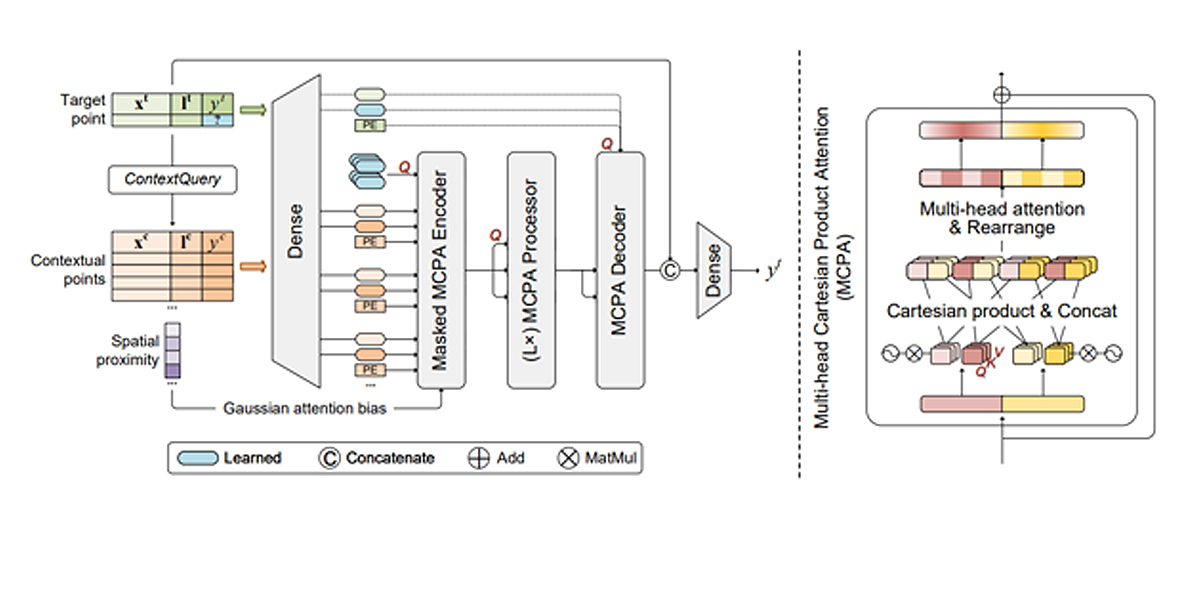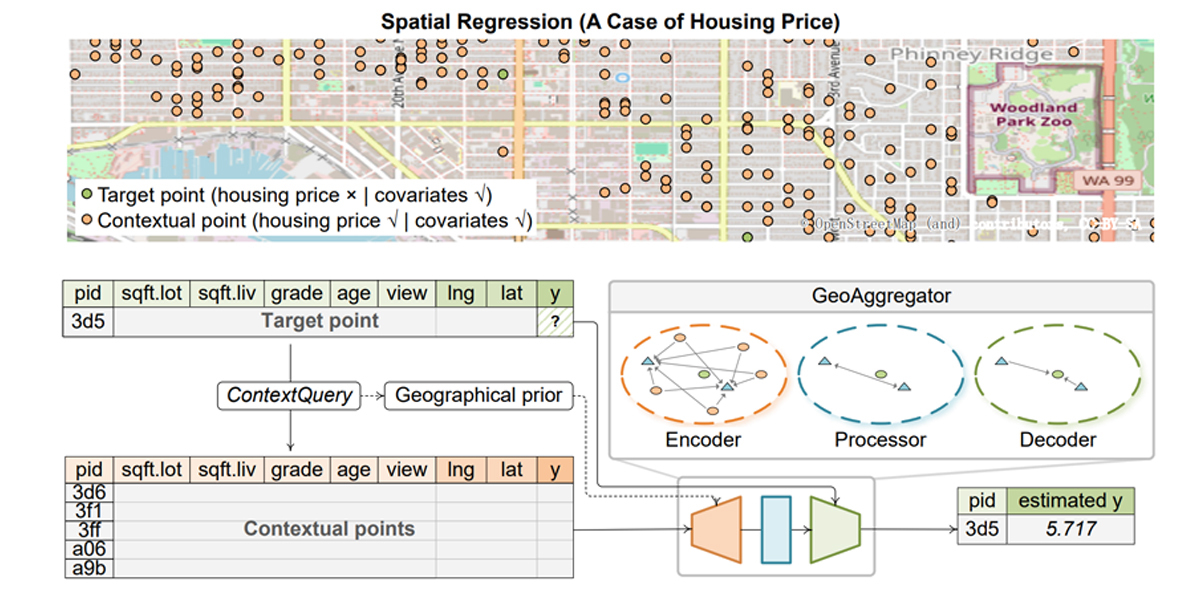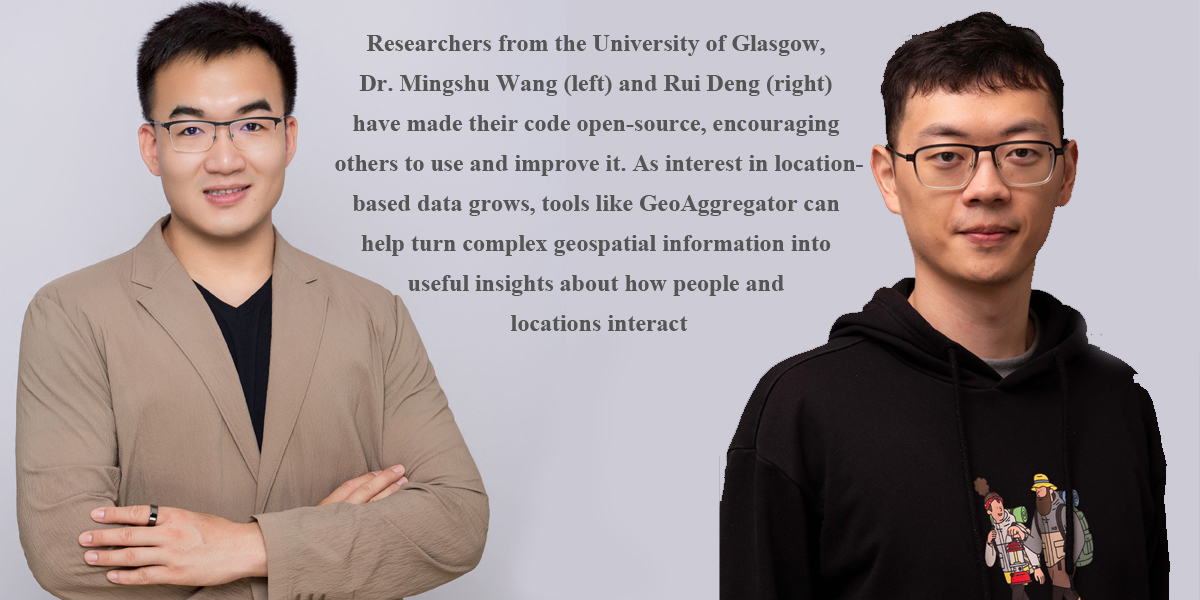Computer analysis of geospatial data could be made more environmentally-friendly thanks to a groundbreaking new software model built by a team of scientists from a Scottish university.

Researchers from the University of Glasgow are behind the development of the model, called "GeoAggregator," which harnesses the power of machine learning to reduce the computational demands of analyzing complex geospatial data sets. The team's paper, titled "GeoAggregator—An Efficient Transformer Model for Geo-spatial Tabular Data" will be presented at the AAAI Conference on Artificial Intelligence this week.
As GPS technology and satellite data become more widespread, massive amounts of geospatial information are being collected daily. However, making sense of this data requires sophisticated modeling techniques that capture complex spatial relationships—something that traditional statistical methods and even existing AI models struggle with.
GeoAggregator addresses these challenges by introducing a lightweight transformer-based AI model that efficiently analyses spatial autocorrelation (how nearby places influence each other) and spatial heterogeneity (how patterns vary from one location to another). Unlike conventional deep learning models that demand huge amounts of computing power, GeoAggregator is faster, more scalable, and requires fewer resources—making it more accessible for researchers and policymakers.

One of GeoAggregator's key innovations is its Gaussian-biased local attention mechanism, which helps the model focus on relevant nearby data points while still considering the broader spatial context. This approach enhances predictions for a variety of spatial data problems, such as forecasting air pollution levels, identifying housing price trends, and analyzing poverty distribution.
Another breakthrough is its Cartesian attention mechanism, which keeps the model lightweight while maintaining high accuracy. This means that even as datasets grow larger, GeoAggregator can process them efficiently—something that many traditional AI models struggle with.
To test its effectiveness, the researchers compared GeoAggregator with widely used geospatial modeling techniques, including geostatistical methods, XGBoost, and deep learning models. The results showed that GeoAggregator consistently performed as well as or better than its competitors across different datasets, including synthetic data, housing price predictions, and air quality assessments.

Crucially, the model achieved high accuracy while using significantly fewer computational resources, making it a practical solution for real-world applications where speed and efficiency matter.
The researchers have made their code open-source, encouraging others to use and improve it. As interest in location-based data grows, tools like GeoAggregator can help turn complex geospatial information into useful insights about how people and locations interact.
Dr. Mingshu Wang, of the University of Glasgow's School of Geographical & Earth Sciences, is one of the paper's co-authors. He said, "The majority of data is geographic in nature, though we often neglect that fact. From real estate transactions to grocery store shopping and business data, if it has a location attached, it's geographic data, and it can be used to help guide decisions across a wide range of applications from the neighborhood scale to the entire world.
"GeoAggregator represents a big step forward in making complex data analysis more efficient and more accessible to everyone. All the data analysis we did during the development of GeoAggregator was done on a single laptop, which shows just how effective a tool it is.
"Many industries rely on understanding spatial relationships to make predictions and plan for the future. With GeoAggregator, organizations can analyze big spatial data more effectively, helping to shape better policies, improve urban planning, and support sustainable development."
The researchers are currently developing an open-source Python package that will make the model freely available to anyone who wants to use it. This development is part of ongoing Ph.D. research by Rui Deng, which will continue to improve the model's capabilities over the next two years.

Mr. Deng, who is the paper's lead author, said, "For small and medium-sized companies, researchers, or teaching purposes where resources are limited, Aggregator provides a way to get highly-accurate data analysis while maintaining efficiency. Even for larger organizations with unlimited computational resources, choosing a more efficient model like this one could boost their efforts to achieve sustainability through reduced energy and water consumption."
Dr. Ziqi Li, Assistant Professor at Florida State University, is an honorary research fellow and co-supervisor of Deng at the School of Geographical & Earth Sciences, is also a co-author of the paper.
The research is part of the University of Glasgow's broadening, multidisciplinary expertise in artificial intelligence and machine learning, following the launch of the Centre for Data Science & AI in September 2023.
In partnership with partners from academia, industry and government, EXAGeo will train 65 new Ph.D. students with skills to develop and apply software for environmental applications which will run on next-generation exascale computing systems.
More information: Rui Deng et al, GeoAggregator: An Efficient Transformer Model for Geo-Spatial Tabular Data (2025). DOI: 10.13140/rg.2.2.25757.01766
Story Source: University of Glasgow
Subscribe to our newsletter
Stay updated on the latest technology, innovation product arrivals and exciting offers to your inbox.
Newsletter

